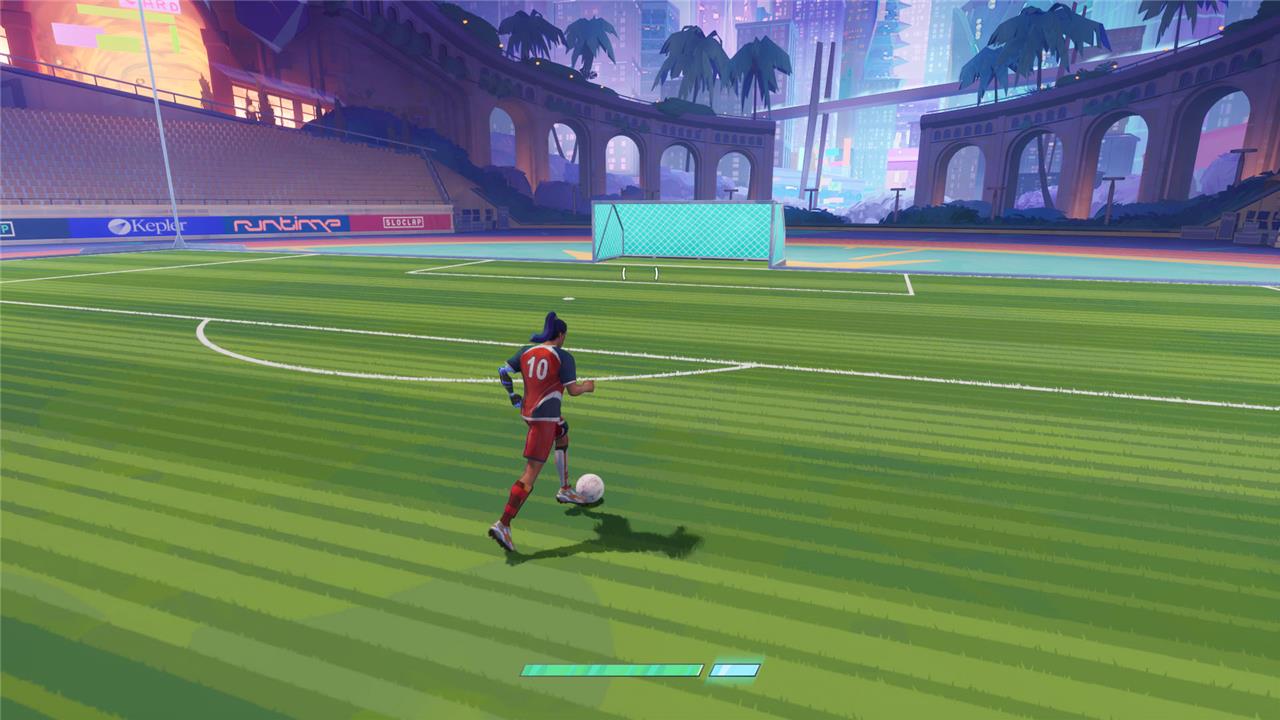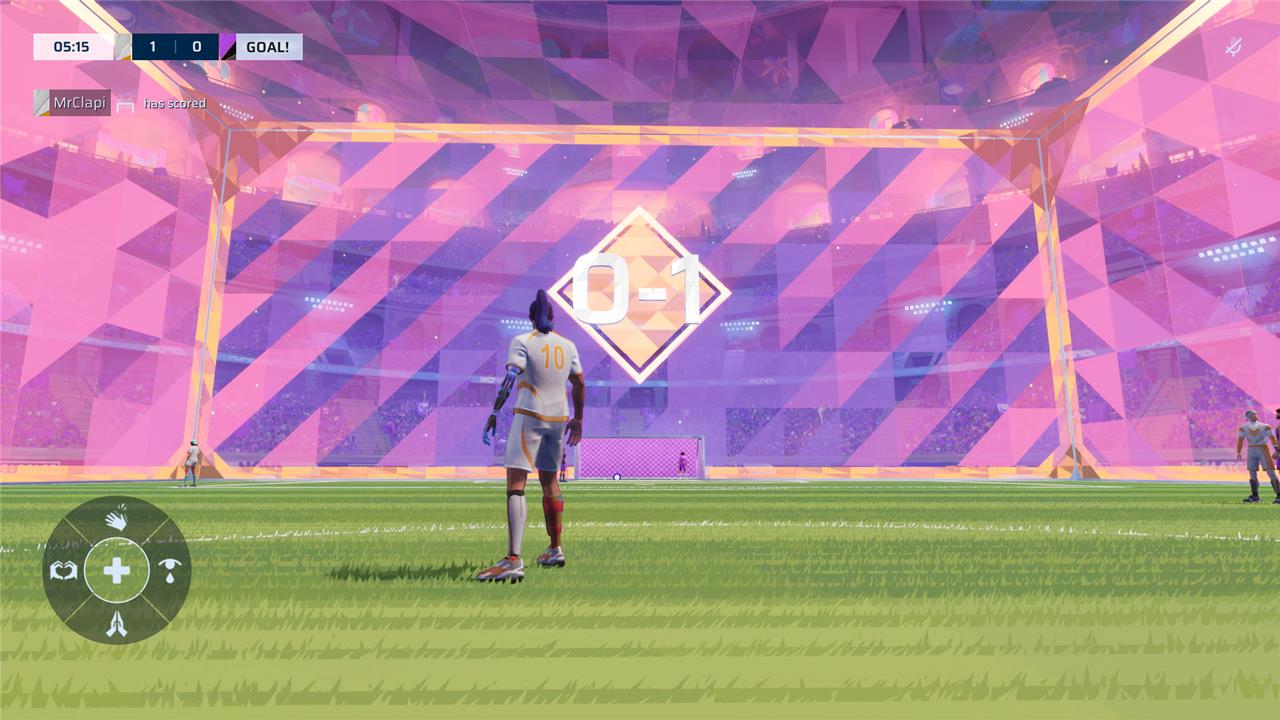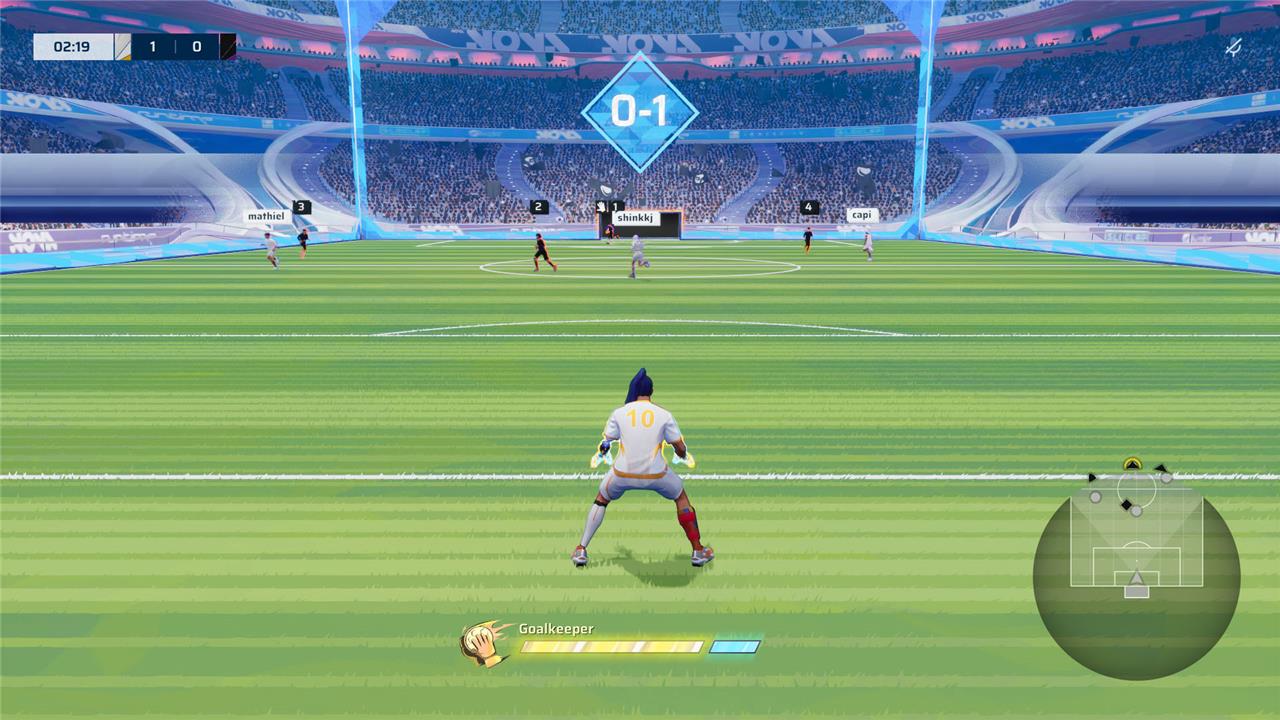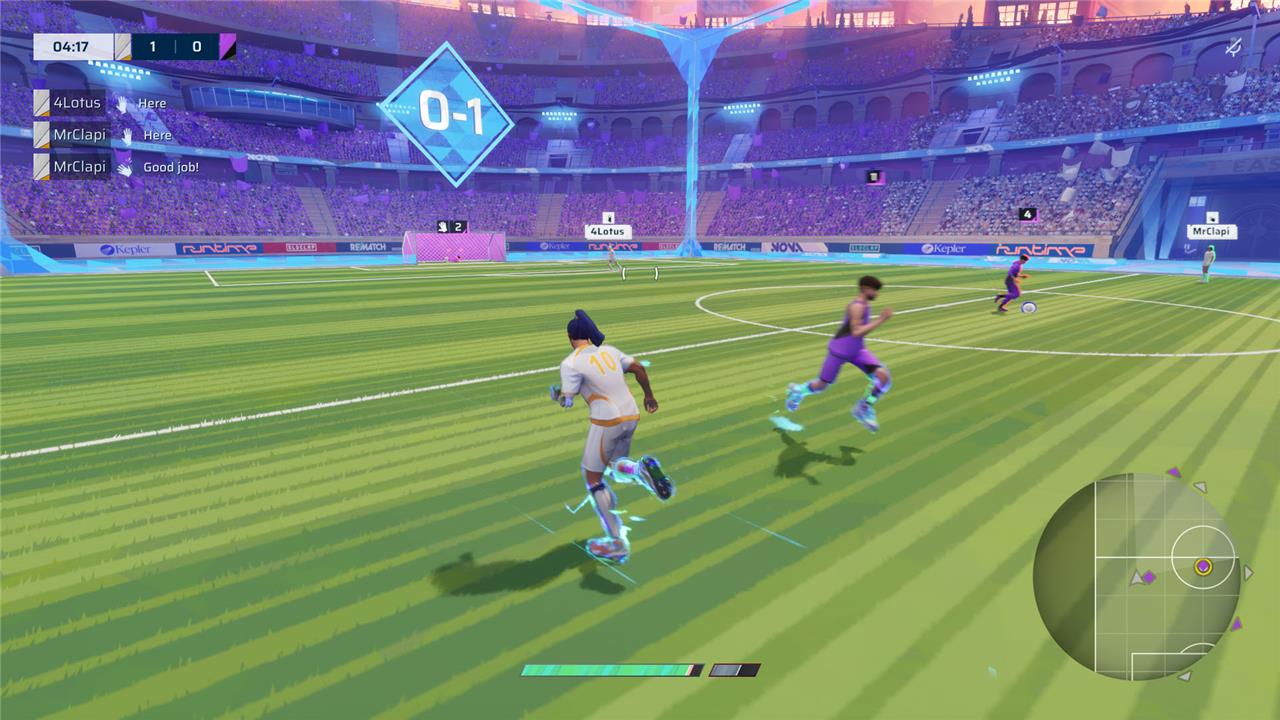Dive into the fast-paced, arcade-style soccer action of Rematch with confidence by mastering these 9 essential beginner’s tips. Whether you’re playing on PC, PlayStation, or Xbox, this guide will equip you with the smart strategies, communication hacks, and skill-building advice you need to outplay your opponents and become an invaluable teammate from your very first match.
The idea of Rematch is much the same as it is for soccer: group up with other players and beat the other team. This largely means kicking the ball, scoring some goals, and picking your victory pose at the end of the match. It’s not that simple, though. A match in Rematch involves more than casually kicking a ball around with friends on the weekend. It requires you to learn how to angle your balls, take advantage of the walls around the field, and master your own character.
To help, read our Rematch beginner’s tips for you to step into a match prepared to win.
Familiarize yourself with your character
Before diving into matches in Rematch, take some time to familiarize yourself with your character’s unique movements and abilities. Each character behaves differently in terms of acceleration, jump height, stopping time, and other physical nuances, which will significantly affect how you handle the ball and interact on the field. Spending time in practice or free play modes to master how your character moves, jumps, and reacts will give you a strong foundation and improve your control during matches. Getting to know your character well is more important than focusing solely on the ball, as this understanding enables smarter positioning, better timing, and more effective gameplay overall. Also, explore customization options to personalize your character’s appearance and even abilities, making the experience more engaging and tailored to your style.

Although the ball is the most important object in a soccer match, you must not forget that your body is your strongest tool. In Rematch, developer Sloclap brought all the physicality from Sifu to its soccer video game, which means that the body of your character responds in a very real (and sometimes clumsy) way.
If you’re just starting to play Rematch, become familiar with how your character moves, how long it takes for them to run or to stop running, how high they can jump to intercept the ball, and so on. In our experience, it’s interesting to always play a little bit in the Freeplay mode or run a Quick Match just to warm up and make moving the digital body of your character more natural during a match.
Look for the right match to improve your skills
To improve your skills in Rematch, it’s crucial to find the right match format that suits your current level and goals. Starting with quick matches like 3 vs. 3 can help you sharpen individual skills in a fast-paced setting, while 4 vs. 4 and 5 vs. 5 matches allow you to focus more on positioning, strategy, and teamwork. Each match type offers unique opportunities to develop specific aspects of your gameplay, from micro-level skill execution to macro-level tactical understanding. Gradually progressing through these formats and communicating with your teammates will enhance your overall performance and enjoyment of the game.
If you’re new to Rematch, you want to take it slow. Every match can be split into two levels, macro and micro. While the latter is all about individual skills, the former encompasses all agents, from players to rules, involved in a game. The Quick Match formats give you space to progressively improve.
You can queue for 3 vs.3, 4 vs. 4, and 5 vs.5 quick matches. The first option is more intense but forces you to improve individual skills. In 4 vs. 4, adding an additional player to each team gives more room to breathe and think about positioning. Lastly, when there are five players on each team, you have the perfect scenario to learn more about the macro aspect of the game – and how to be more tactical.
Let your teammates know what you’re thinking
In Rematch, effective communication with your teammates is crucial for success. Use the built-in ping system by pressing the Right Stick or Middle Mouse Button to call for the ball and give position-specific cues, helping teammates know exactly where you want the pass. Balance your calls to avoid spamming and use preset chat options like “we got this,” “sorry,” and “good job” to maintain positive team morale. Even without a microphone, these simple communication tools allow you to coordinate plays and keep your team informed about your intentions during fast-paced matches

There’s an inherent challenge that every player must face when hoping into multiplayer matches: Communication. To work as a team, you need to let the other players know what you have in your mind and you need to know their plans as well. Rematch offers voice chat, providing a direct channel to talk to your team.
However, if you don’t feel comfortable letting your mic open and talking to random players, then the Ball Call command is going to become your best friend. With a simple click of a button (on controllers you use the right stick), you can signal to whoever has the ball that you’re open to receive it. While it only conveys one idea, the Ball Call command is probably all your team needs to know that they can count on you.
Contribute however you can
No matter your skill level, contributing to your team in Rematch is about doing what you can, whether that means making smart passes, positioning yourself well, or communicating effectively. Even small actions like using the Ball Call command to signal you’re open or swapping roles fluidly during the match help build teamwork and increase your chances of success. Everyone’s input counts, so focus on supporting your teammates and improving step by step to make a meaningful impact in every game.
Because it takes time to master all the commands in Rematch and instinctively respond to situations, don’t worry too much about scoring goals. The best strategy for new players is to contribute however they can. The game rewards you for any useful move you make. Try to intercept the other team or make a clean pass to a teammate, for instance. Non-shooting actions still give you experience points that’ll level up your character.
Even if you haven’t scored one single goal in a match, that’s okay! You can positively impact the outcome by assisting other players to take the ball and put it inside the goal. You’re still as important as the scorers on your team.
Receiving and controlling are more important than shooting
In Rematch, focusing on receiving and controlling the ball is more important than shooting, especially for beginners. Proper ball control ensures you maintain possession and create better scoring opportunities. Early in the game, you might struggle with losing the ball when trying to receive passes due to the game’s physical mechanics. To improve, tap the Push Ball command repeatedly when receiving a pass to stabilize control, and once you have the ball, enter Dribble Stance to manage it more effectively. Mastering these foundational skills allows you to position yourself strategically and set up plays rather than rushing into shots that often lead to turnovers.
Scoring the winning goal is the peak of a match for any player in Rematch. Even so, to reiterate the above tip, your focus should first be on mastering the art of receiving and controlling the ball. You can’t shoot a ball if you can’t keep it with you.
Because of the physicality in Rematch, you’ll often lose the ball when trying to receive it in your first matches. The secret to receiving the ball effectively every time a teammate passes it to you is to press the Push Ball command multiple times. Timing the correct moment is hard, so just keep pressing the command. Once you have the ball, use the left trigger (L2) to enter the Dribble Stance, which gives you more control over it.
The walls are on your side
In Rematch, the field’s walls aren’t just boundaries-they’re a tactical resource that can transform your play. You can use the walls to bounce passes to yourself or teammates, making it much harder for opponents to intercept and opening up creative ways to advance the ball or launch attacks. Mastering wall rebounds lets you set up long passes or craft surprise plays, including tricky shots on goal that catch goalkeepers off guard. As you practice, think of the walls as another teammate: use them to break free from pressure, keep the ball in play, and surprise your opponents with unexpected angles and rebounds.
Rematch offers a very realistic experience of playing soccer, with one major difference: The field is surrounded by walls. While they literally keep the ball rolling by preventing it from leaving the field, the walls also work as additional players that you can take advantage of.
You can practice tricking the opposing team with the walls. Make them believe you are missing a shot when you’re actually passing the ball to your teammate next to the goal area. Use the angles to escape the defense and make a clear cut through it. Prepare a beautiful volley shot by using the walls to put the ball in the air. Get creative, play around!
Be ready to catch the ball in moments of distress
In Rematch, being ready to catch or intercept the ball in moments of distress is crucial for keeping possession and turning the game in your favor. This means anticipating the ball’s trajectory, positioning yourself effectively, and using your character’s realistic movements to secure control, even under pressure. Improving your timing to initiate clean catches or passes during chaotic plays will help you contribute significantly to your team’s offense and defense, preventing opponents from gaining an advantage and setting the stage for successful counterattacks.

Whether you’re playing 3v3 or 5v5, there are no fixed positions in Rematch. The game was designed to rotate players during a match, giving each person the chance to be right in front of the other team’s goal or defend your team from the opposing team’s attack. This might not sound like the best scenario, but it is actually extremely useful because anyone can become the goalkeeper when needed and save the day.
In Rematch, the goalkeeper is the only one capable of holding the ball with their hands, protecting the goal, and becoming invulnerable to sliding tackles. Because there are situations where the player who was the initial goalkeeper leaves their position to help the defense or force an attack, having the chance of replacing the goalkeeper is key to restructuring the defense if all goes wrong and the other team gets the ball back.
When using a controller, speed the camera up
When using a controller in Rematch, increasing the camera speed is highly recommended to better track the ball and keep up with the fast-paced action on the field. A higher camera speed allows for quicker pivots and smoother control when following the ball and opponents, which is crucial for effective positioning and timely reactions. Most players find settings around 1.5 to 1.7 for controller camera speed to strike a good balance between responsiveness and control, while also turning off camera shake to avoid distractions. Adjusting these settings in the options menu can significantly enhance your gameplay experience by making it easier to stay aware of your surroundings during matches.
Following up the ball around Rematch matches and keeping track of the opposing team is a sluggish endeavor if you’re using a controller. You can make your life easier by raising the camera speed for controller.
To tweak this specific setting, go to the System menu and choose Options. In the Gameplay tab, you find the option to regulate the camera speed. By increasing it, you can pivot to where you’re looking at faster. For players who are playing Rematch on consoles or prefer to use controllers, changing the speed will definitely raise your chances of winning.
Know when to run faster
In Rematch, knowing when to run faster is crucial for seizing key moments on the field. Use sprint bursts strategically, such as to outpace defenders or quickly reach open space for a pass. However, sprinting consumes stamina, so it’s important to conserve it and avoid constant running at top speed. Timing your sprints well-like breaking away after receiving the ball or chasing down a loose ball-can create scoring opportunities or help your team defensively. Mastering sprint management will enhance your control and effectiveness throughout the match.

Crossing from one side to the other of the field is a basic aspect of soccer, so you will be constantly sprinting during a match while trying to shoot the ball or reach your opponent. But because sprinting depletes your stamina, you must carefully choose when you use it. That’s why you should prioritize using Extra Effort all the time.
In Rematch, Extra Effort is a charge that you can use by double-tapping the sprinting button. You receive a boost of speed for a few seconds when you use the charge. Despite its short duration, Extra Effort is a strong mechanic – it doesn’t cost you stamina, and the charge replenishes considerably fast. You want to pop Extra Effort to quickly reposition or to gain the lead when running after the ball.
What are the essential skills I need to master before my first match
Before your first match in Rematch or any competitive game, it’s essential to master a few key skills to build confidence and perform well:
-
Basic mechanics and controls: Understand and practice the fundamental gameplay mechanics such as passing, shooting, positioning, and movement. Smooth execution of these basics allows you to contribute effectively from the start.
-
Communication and teamwork: Learning how to coordinate with teammates, call out plays, and play your role enhances your team’s overall performance.
-
Game awareness and positioning: Knowing where to be on the field or court, anticipating opponent moves, and reading the flow of the match is critical.
-
Physical and mental readiness: Build endurance and stay calm under pressure. Mental preparation involves focusing on the present moment and adapting strategies as the match progresses.
-
Skill drills: Regularly practice skill-building drills targeting ball control, passing accuracy, and situational tactics to improve muscle memory and decision-making.
Specifically for Rematch, which is an arcade-style soccer game, key skills include mastering passing, shooting timing, player positioning, and communication with teammates for coordinated play, as outlined in beginner tips you may have encountered in your guide. Practicing these will help you outplay opponents and contribute to your team’s success from your very first match.
This skill set is consistent with general recommendations for first matches in competitive sports or esports, where focusing on core skills, fitness, mental strength, and teamwork is advised to ease the transition into live competition.
How important is basic footwork for my first tennis match
Basic footwork is extremely important for your first tennis match. It forms the foundation of your game, directly affecting your balance, timing, and control during play. Good footwork allows you to position yourself correctly, reach the ball efficiently, execute shots with precision, and recover quickly after each shot, all of which are crucial for consistent performance.
Many beginners underestimate footwork, focusing too much on strokes like forehand and backhand, but being out of position due to poor footwork often causes mistimed or weak shots regardless of technical ability. Key footwork habits include performing a proper split step before your opponent’s shot, staying light on the balls of your feet, maintaining a wide and stable base, and making small, controlled adjustment steps rather than lunging wildly.
For your first match, developing solid footwork will help you move with confidence, give you more time to react, and improve your consistency. It also enables you to recover quickly and prepare for the next shot, a skill often neglected by beginners but vital in competitive play.
In sum, mastering basic footwork is arguably more important than stroke technique at the beginner level because it underpins your ability to execute shots effectively and maintain good court positioning. Prioritize footwork drills alongside your stroke practice to maximize your readiness for your first match.
